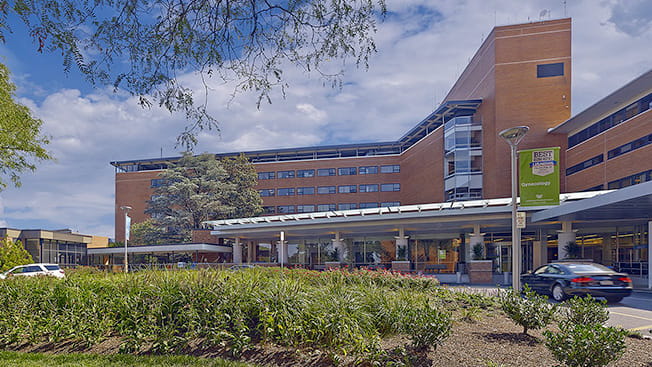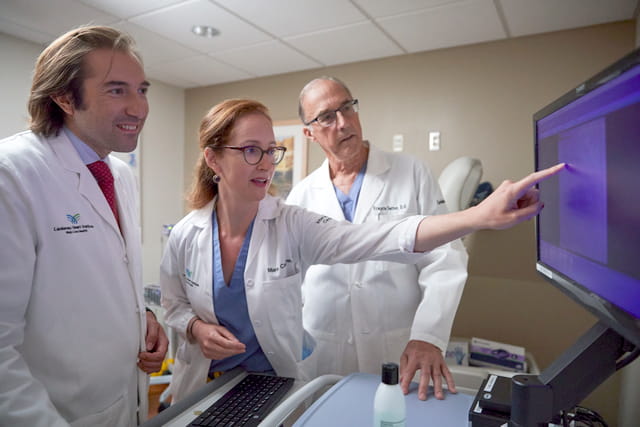Percent of patients at Lankenau Medical Center having minimally invasive surgery for coronary bypass far exceeds other U.S. hospitals

Despite older population, long-term clinical outcomes for Lankenau Medical Center-pioneered procedure are as consistently strong as the nation’s top clinical trials. It shortens recovery.
Wynnewood, PA — In 2005, Francis Sutter, DO, Chief of Cardiac Surgery at Lankenau Medical Center, part of Main Line Health, pioneered an advancement in the field of coronary artery bypass surgery—offering an alternative approach to traditional open-heart surgery. Lankenau launched one of the nation’s first programs for minimally invasive, robotic-assisted cardiac bypass surgery, seeking to reduce risks and decrease long-term complications as well as dramatically cut recovery time.

Results presented last week by Main Line Health physician researchers at one of the world’s leading organizations for cardiothoracic surgeons showed the percentage of patients at Lankenau having bypass surgery performed robotically is nearly 50 times higher compared to the rest of the nation’s medical centers. The research also demonstrated that, despite an older patient population, Lankenau’s long-term outcomes over 16 years were consistent or better than those in groundbreaking international clinical trials.
Results were presented Saturday at the Society of Thoracic Surgeons (STS) annual meeting in San Diego by the Lankenau Institute for Medical Research (LIMR) study’s lead investigator. LIMR is Main Line Health’s research division.
“It’s gratifying to see these results place Lankenau at the leading edge,” said Sutter, who accompanied professor Aleksander Dokollari, MD, PhD, Lankenau cardiac surgery researcher and presenter at the event. “I began performing the robotic procedure in 2005 because the traditional open-heart method was often too traumatic for older patients. Even if you conducted the procedure flawlessly, they tended not to fare as well. We now know for certain that robotic bypass surgery not only gives them a better chance but allows patients to recover more quickly.”
In 2021, 54.9% of all coronary artery bypass procedures performed at Lankenau were done robotically, according to the most recent annual STS reporting data, compared to 1.2% performed nationally.
“These kinds of results are why cardiac specialists throughout the region refer coronary bypass patients to us,” said Katie Galbraith, MBA, FACHE, President, Lankenau Medical Center. “High volumes lead to better outcomes. Most importantly, we’re getting patients back to their daily activities, home to their families and back to work faster. I’m grateful to LIMR’s researchers for compiling and analyzing the data that illustrates we are national leaders in robotic coronary bypass surgery. I know our team is dedicated to only getting better.”
The team at Lankenau has performed more than 2,500 robotic bypass surgeries to date. Sutter has personally performed over 2,300 of them, more than any surgeon in the United States. Gianluca Torregrossa, MD, joined as the director of the Robotic Coronary Revascularization Program at Lankenau Heart Institute in 2021, with the goal to drive further innovation.
With minimally invasive coronary bypass surgery, patients get back to their daily lives in half the time compared to recovery from an open-heart procedure. The surgeon needs only three to four very small keyhole incisions for inserting the robotic arms and camera in between the ribs, and the heart is kept beating during the procedure. With the traditional bypass procedure, the surgeon makes a 10-inch chest incision and cuts through the breastbone. The patient is placed on a heart-lung machine and the patient’s heart is stopped. The vast majority of robotic and traditional bypass patients at Lankenau are taken off the ventilator before leaving the operating room. Most traditional bypass patients at other institutions are not.
Detailed results of the LIMR research are as follows:
- The fifteen-year survival rate for Lankenau bypass patients was comparable to that found in the trial to which it was compared. Notably, the Lankenau patients on average were significantly older (71 years old) than those in the comparison trial (65).
- The low percentage of surgeries free of major adverse events (death, myocardial infarction, need for repeated procedure) was comparable to trial results published in the New England Journal of Medicine despite the same average age difference.
- Hospital complications such as postoperative atrial fibrillation and the need for transfusion due to bleeding were lower when compared to results of two trials.
As with traditional coronary artery bypass surgery, females in the general population undergoing robotic coronary bypass surgery had higher rates of blood transfusion, postoperative atrial fibrillation (irregular heart rhythm) and a higher risk of requiring repeat coronary intervention in the cardiac catheterization lab, the authors found. Women generally have a lower body mass index, which correlates with smaller coronary vessel size and, thus, potentially greater vulnerability to certain complications. The findings are in line with other clinical studies.
The other coauthors were Michel Pompeu Sá, MD, MSc, PhD; John Malin, DO; Serge Sicouri, MD; MaryAnn C. Wertan, RN; Basel Ramlawi, MD, chief of cardiothoracic surgery, Main Line Health; and Gianluca Torregrossa. The study reviewed data for all patients undergoing robotic bypass from 2005 to 2021.
Overall, long-term outcomes were comparable between robotic-assisted and traditional bypass surgery.
About Lankenau Medical Center
Founded in 1860, Lankenau Medical Center is recognized among the top hospitals in the Philadelphia region for exceptional patient care. We offer a comprehensive range of primary care, disease prevention, and specialized medical and surgical services, including advanced treatments in cardiovascular, cancer care, maternity and orthopaedics and a level II trauma center.
Neonatologists from Children's Hospital of Philadelphia provide specialized newborn and neonatal intensive care in our level III Neonatal Intensive Care Unit.
A leader in medical education, Lankenau Medical Center trains a diverse group of residents and fellows participating in various programs across multiple specialties. The hospital is also home to the Lankenau Institute for Medical Research, where groundbreaking research advances the detection, diagnosis and treatment of diseases and offers access to clinical trials.
Lankenau Medical Center combines compassionate care with cutting-edge technology in a patient-centered environment.
About Lankenau Institute for Medical Research
Lankenau Institute for Medical Research (LIMR) is a nonprofit biomedical research institute located on the campus of Lankenau Medical Center and is part of Main Line Health. Founded in 1927, LIMR's mission is to improve human health and well-being. Using its ACAPRENEURIALTM organizational model that integrates academic and entrepreneurial approaches, faculty and staff are devoted to advancing innovative new strategies to address formidable medical challenges including cancer, cardiovascular disease, tissue regeneration, gastrointestinal disorders and autoimmune diseases such as rheumatoid arthritis. LIMR's principal investigators conduct basic, preclinical and clinical research, using their findings to explore ways to improve disease detection, diagnosis, treatment and prevention. They are committed to extending the boundaries of human health through technology transfer and training of the next generation of scientists and physicians.
About Main Line Health
Founded in 1985, Main Line Health® is a not-for-profit health system serving the Philadelphia region and beyond. Main Line Health consists of five hospitals, seven health centers and over 150 medical practice locations. The System has more than 14,000 employees and over 2,100 employed and independent physicians and advanced practice providers.
At its core are four of the region's most respected acute care hospitals — Lankenau Medical Center, Bryn Mawr Hospital, Paoli Hospital and Riddle Hospital — as well as one of the nation's premier facilities for rehabilitative medicine, Bryn Mawr Rehab Hospital. Main Line Health also includes Mirmont Treatment Center for drug and alcohol recovery; Main Line Health HomeCare & Hospice, providing skilled home healthcare and hospice services; Main Line Health Centers, primary and specialty care, lab and radiology and other outpatient services located in Broomall, Collegeville, Concordville, Devon, Exton, King of Prussia and Newtown Square; and Lankenau Institute for Medical Research, a biomedical research organization.
Main Line Health's medical staff benefits from a collaborative relationship including independent physicians, community healthcare professionals and hospital-based experts from Main Line HealthCare, the employed multi-specialty physician network of Main Line Health.
Main Line Health collaborates with top experts to deliver exceptional specialty care. Through our affiliation with the Children's Hospital of Philadelphia, doctors and advanced practice providers care for pediatric patients at select Main Line Health locations, including the neonatal intensive care units at Main Line Health's four acute care hospitals, as well as Bryn Mawr Hospital's Inpatient Pediatric Unit and Emergency Department. Jefferson Health neurosurgeons and neurointerventionalists provide 24/7 specialized care, including neurointervention and lifesaving stroke care, and trauma surgeons provide critical care to our patients. Through our affiliation with Sheppard Pratt — a nonprofit provider of mental health services, substance use, developmental disability and other comprehensive behavioral health support — patients receive compassionate care in a welcoming environment.
For more information, visit mainlinehealth.org and connect with us on social media:
LinkedIn: www.linkedin.com/company/main-line-health
Facebook: www.facebook.com/mainlinehealth
X (formerly known as Twitter): www.twitter.com/mainlinehealth
Instagram: www.instagram.com/mainlinehealth